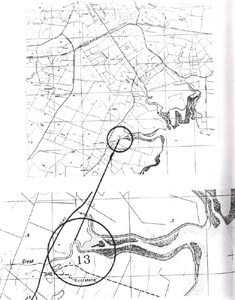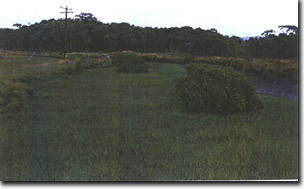13. Old Hat Creek (Tidal Creek)
This information has been developed from the publication:
|
| Location | 313164. Tidal channel of Old Hat Creek 500 m north of "Kooratang". |
Access: | Fullers Road. |
Significant Features: | The tidal channel of Old Hat Creek is lined by mangroves although these represent only a remnant of a much broader mangrove/salt marsh complex that has been a much broader mangrove/salt marsh complex that has been substantially drained and cleared. The site is of significance for the present of the introduced grass Spartina townsendii (rice grass or cord grass). Like mangroves, Spartina needs regular salt water tidal inundation and therefore forms a pioneer plant community on tidal mud flats. It is used extensively as an agent of land reclamation in the Netherlands and the U.K. and has been introduced to a number of sites in South Gippsland. It grows in abundance in Andersons Inlet. It was planted In Tidal Creek (Old Hat Creek) in September 1930 and other material was planted a few weeks later. Although many of the plants died, there were sufficient survivors to form the basis of an extensive colony and this has spread along several hundred metres of tidal flat beside Old Hat Creek. |
Significance Level: | No applicable. This site is certainly of interest but is inappropriate to be nominated as a significant site. Spartina is an exotic species and become an aggressive invader displacing mangrove and salt marsh. It has the potential to spread to many sites in northern Corner Inlet and undesirably physiographic or ecological consequences of this spread need to be evaluated. This site is of particular interest as being the place of the first effective establishment of Spartina in Australia. Records of the time, place of the plantings and the origin of the plant material are available and the site has been regularly monitored and are available and the site has been regularly monitored and photographed. It provides a useful bench mark for determining the impact of the grass in tidal inlets. |
Management Issues: | Because the site is not on an open coast, the rate of natural spread of propagative material to other sites is reduced. Material from here has been successfully transplanted at other Corner Inlet sites although these have not been recorded as accurately as that at Old Hat Creek. Because of the ability of the grass to change inlet physiography, this site should be closely monitored to observe related changes. Unauthorised removal or further planting at this site should only be carried out with advice from appropriate authorities after evaluation of the potential for change. |
Research & Monitoring Requirements: | Detailed mapping of the distribution of Spartina, Mangroves and salt marsh should be carried out here. This should be done as part of a detailed programme measuring geomorphological, hydrological, sedimentological and other ecological parameters of the site. |
Public Interpretation Possibilities: | This could be done at an off-site display centre that explained the biology of Spartina and the history of the grass in South Gippsland. |
Main References: | Boston, K. G. (1981). 'The introduction of Spartina townsendii to Australia.' Occasional Papers No. 6, Melbourne State College. |
 Site 13 |  Spartina spreading along Old Hat Creek (tidal creek) |


